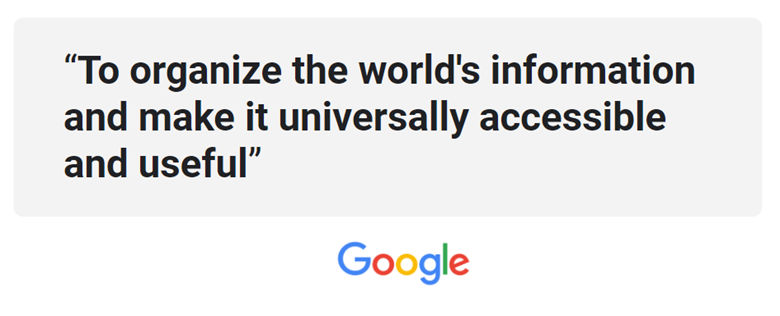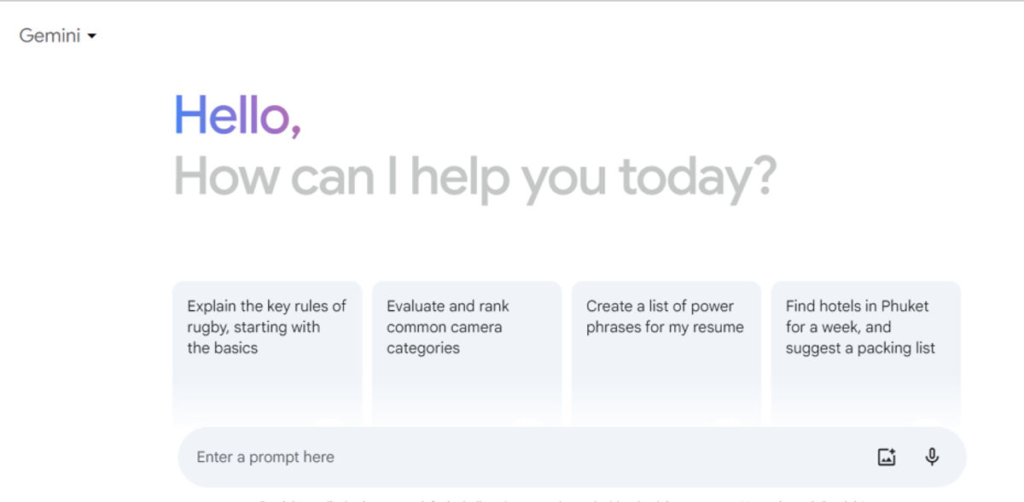This has to be the best mission statement ever. Not only is it still around 25 years later, but Google has built a $2 trillion company by sticking to its plan.

When ChatGPT launched on November 30, 2022, discussions immediately began about the threat to Google's dominance in search. What really threatens this near-monopoly search is the rise of social networks. But this is a bigger problem. Could generative artificial intelligence disrupt the very core of Google's business?
Google Shopping
It's a simple concept. The specific search keyword has a clear intent and the user is searching for her product, not her website. And even if you understand the intent, the original 10 blue links in the search results are not in the best format. You can skip steps by showing your products directly in the search results. Users aren't interested in his Macy's or Best Buy homepage. These sites require secondary searches to find products. It's better to bypass the homepages of these brands because it's a faster way for users to get what they're looking for. It started with Google Shopping, a version of which has been around since his 2002.
Google Travel
Google Travel is primarily on a similar platform. It may seem obvious in retrospect, but it took a long time to apply it to travel products. We started with airline tickets about 12 years ago and have since expanded to include hotels, attractions, transportation, and vacation rentals.
These searches for flights and hotels are often very clear. There's a reason why familiar fields like destination, dates, and guests are featured on every online travel agency's homepage. Once you realize that, it will be a better experience for your customers to bypass these OTA sites and display flights and hotels directly, allowing users to modify and filter their searches within her Google.
Generation AI
So how does all this fit together? There has definitely been a high level of panic at Google over the past 15 months. I've never heard a technology leader say they saw this coming. Before ChatGPT, the generation AI in previous versions was clunky and didn't seem threatening. That launch changed everything. This field is moving so fast, led by his OpenAI and Microsoft, that it's easy to imagine how it could disrupt Google's entire advertising model in a very short period of time.
The innovator's dilemma
This is the ultimate example of the innovation dilemma. For many user searches and customer objectives, these LLM (Large Language Model) chatbots clearly return more useful responses than Google searches. LLMs, for better or worse, received their training on the internet and learned everything on the internet, so in theory they already have all the information and answers.
Therefore, in accordance with its mission (and it intends to do so), Google should switch to generative AI responses to increase the proportion of search results (Google OneBox is only an early version of that). The generated AI response attempts to fully answer your question or search without having to explore other websites, sometimes chatting back and forth. But Google's entire model is built around showing organic results, not just ads, and the chatbot format doesn't lend itself immediately to that. So how do you go up against AI search websites like ChatGPT and Perplexity?
gemini
Google's latest generative AI release, Gemini, finally competes in quality with OpenAI's ChatGPT. Combined with Google Travel, this could create a great opportunity for Google to test new search result formats and overcome dilemmas without sacrificing revenue.
There may be changes coming soon to top-of-funnel discovery search. Most travel writers think their site is special and unique. Most are just rehashing the same old lists, recommendations, and top tips. Google could probably abolish 99% of it. All of its contents can be replaced with Gemini LLM responses. The top 1% that actually provides unique and valuable content is enough, and Google will find a way to incorporate it. That would be a better experience for the user. today.
Traffic becomes much more valuable to Google when it's closer to a transaction. This is where Google Travel comes into play. Gemini already integrates with Google Maps, Flights, and Hotels. Searching on Gemini brings him a direct feed through Google Travel, which ultimately leads him to booking pages on OTA, hotel, and airline sites. Gemini doesn't yet have a Things To Do product, but these can be incorporated into the Gemini format in the same way as flights and hotels.
Gemini makes Travel and Maps even more useful by providing detailed searches that were not possible with algorithms alone. Google Travel also makes Gemini even better because users are often looking to purchase flights, hotels, and activities. Each strengthens the others.
Gemini's other integrations, such as Gmail, Docs, and Calendar, are sure to add value as well. Many see this as a travel planner argument: “Customers search 35 sites. Travel is broken. This is my app.” it's not. That's just a good find. What happens when a user goes from searching 35 websites to book a trip to only 5 websites with the addition of Gemini? We know that many people enjoy the planning stage, but Gemini could replace those websites. Because Gemini not only has all the answers, but also recreates the fun part of travel discovery.
These changes can happen much faster than people expect. ChatGPT is challenging Google every day, especially with its GPT integration. Google no longer has the luxury of rolling out changes on a schedule of its own choosing. These changes are likely to be much more dramatic than previous algorithm updates for many publishers. Optimizing content for LLM training is new to everyone and poorly understood. Those in the travel industry need to watch this closely.
About the author…


